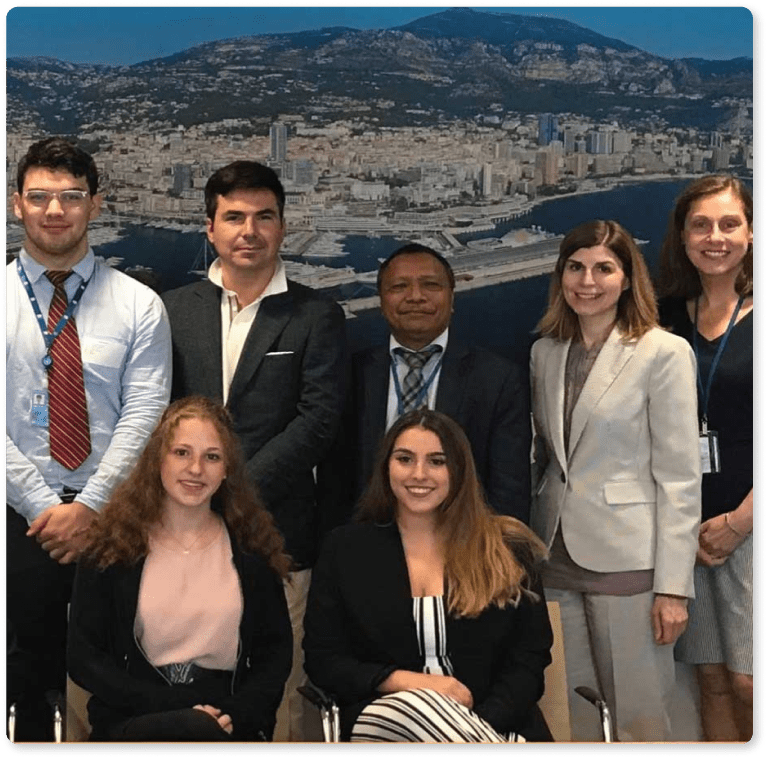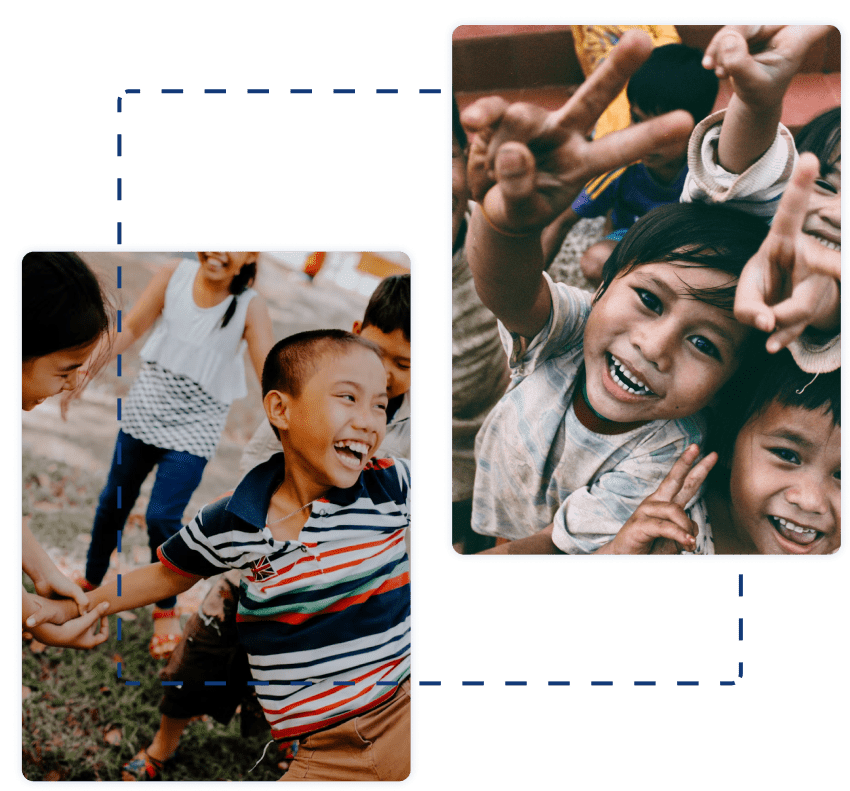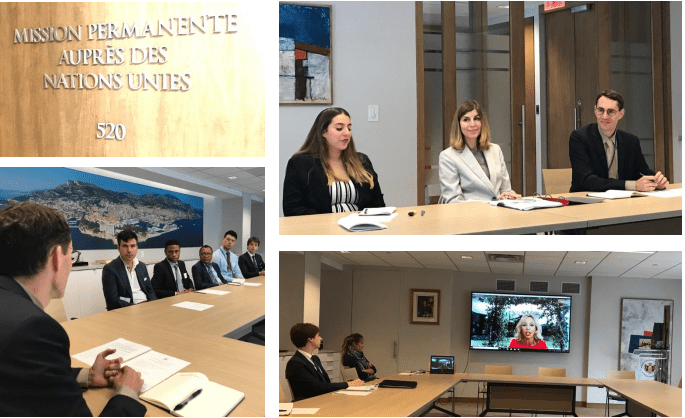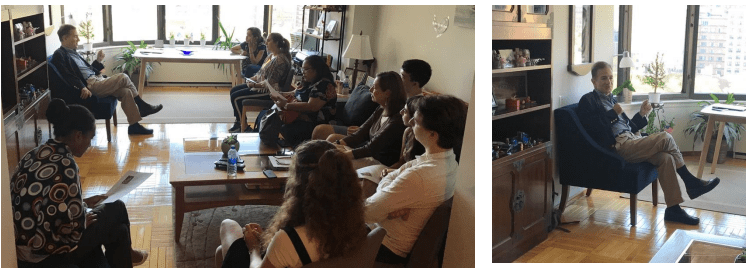PRINCE ALBERT II OF MONACO LEADERSHIP IN POST CONFLICT DEVELOPMENT AWARD INAUGURAL EDITION – AUGUST 2019


EXECUTIVE SUMMARY
After 14 years of existence – and numerous post conflict development projects in Haiti, Ivory Coast and Timor-Leste – the FPCD inaugurated its Prince Albert II Leadership in Post Conflict Development Award in August 2019.
This award program aims at empowering young leaders from different backgrounds by offering them training on post conflict development and global sustainability. The FPCD believes in the power of education to inspire change and to build a new generation of leaders engaged in creating a sustainable world.This program was named after H.S.H. Albert II of Monaco because of His historic patronage to the FPCD and His substantial help throughout the years. Thanks to His generosity, the Foundation was able to open maternal health clinics and youth recreational centers in TimorLeste in the past. Thus, special relations arose between Monaco and Timor-Leste. This led the Foundation to identify youth from Monaco and Timor-Leste for the first edition of its Prince Albert II Award program.
Maria do Ceu, Francelina, Anaïs and Justine were chosen as the 2019 Award winners. They are four leaders from TimorLeste and Monaco who came to New York City and Salt Lake City, Utah to meet the FPCD experts, members of Civil Society, diplomats, and UN officials, and learn about international diplomacy, development and global sustainability.
For eight days they not only learned from global experts but also from each other – as the goal of this program was also to foster sharing about their different cultures, perspectives, and ideas on resolving post conflict and sustainability issues. They also had the great opportunity to discuss the role of the youth in communities all around the world, and to share their own views on what sustainability should be in the future at the 68th UN Civil Society Conference in Salt Lake City. The award program culminated with the FPCD youth-led workshop entitled “Sustainable Communities and Post Conflict Development” at the UN Civil Society Conference, which received praise from the audience.
LETTER FROM FPCD FOUNDER AND EXECUTIVE DIRECTOR
The FPCD has been a non-governmental organization in associated status with the United Nations Department of Global Communications since 2009.
As such we have a responsibility to actively participate in the work of the Organization. The most important event of the year for civil society is the UN Civil Society Conference whereby we were asked to accredit youth participants. The FPCD answered the charge by devising a unique Award Programme that honours HSH Prince Albert of Monaco, the High Patron of the Foundation, on one hand and provides a unique and inspirational experience for outstanding youth leaders on the other.
FPCD has always engaged in country-led programmes that benefit women, youth and families. The Prince Albert II Leadership Award Programme mirrors this methodology by providing criteria to the Governments of Monaco and Timor-Leste of the ideal profile for the winners and allowing those governments to decide who should be chosen as they are in the best position to determine the leadership potential of their respective citizens. There were 3 main goals of the Programme:
Goal #1 – Expose the award winners to the United Nations and international diplomacy Goal
Participate at the 68th United Nations Civil Society Conference Goal
Foster cultural exchange and understanding
In this report it will be explained how the FPCD achieved the 3 main goals of the Prince Albert Leadership Award Programme. The FPCD provided an intensive framework and opportunity to four outstanding young women. who were open-minded, flexible, spirited, and kind. There is a lot of room for reflection and improvement in future editions of the program, however it is certain that the FPCD will continue this unique programme….


THE FOUNDATION FOR POST CONFLICT DEVELOPMENT
The mission of the FPCD is to fulfill the UN Sustainable Development Goals in post conflict situations. The way we accomplish this is twofold:
– to empower women through creating access to maternal health services, improving maternal health culture, and providing training opportunities, – to empower and engage youth by creating recreational spaces that promote inclusion, support education, and encourage positive participation in society
The organization links post-conflict countries with good-willed partners to concretely address these needs. Different programs were implemented in Haiti, Ivory Coast and Timor Leste.


OUR AWARDEES


Anaïs Culotto, born July 30th, 1998, is a young leader from Monaco. She is a sophomore student at the International University of Monaco, majoring in Communication and Event Management. She currently works for the Grimaldi Forum and she participated in the organization of the 30th anniversary of the Convention on the rights of the child in Monaco. In her university, Anaïs initiated a project on ocean preservation and helped launching the campaign “Objective Zero Plastic” during the Monaco Ocean Week in March 2019.


Maria Do Céu Jorge Oliveira Gusmão, born July 21st, 1995, is a young leader from Timor-Leste. She is a student Institute of Business at Dili, majoring in Information and Communication Technology. She is a consultant for UNICEF Dili, chief of the division Information and Communication Technology of the Alumni Parlamentu Foinsa’e Timor-Leste (alumni parliament) and a former member of the Young Women Making Change group. Maria Do Céu was also a contributor to the media outlet Tafara.tl.


Justine Rose, born December 17th, 20002, is a young leader from Monaco. She is a high school student at Lycée Albert I de Monaco, majoring in literature. She is involved in several charity organizations and participated in Model United Nations sessions.


Francelina Soares de Jesus, born May 19th, 2001, is a young leader from Timor-Leste. She is a student at the Dom Thomas schools at Liquedoe. She represented the young women of Aileu in front of the National Parliament of Timor-Leste and participated in several meetings on young women leadership. Francelina is also a member of the Youth Parliament of TimorLeste, as a representant of her municipality.
GOAL #1 – EXPOSE THE AWARD WINNERS TO THE UNITED NATIONS AND INTERNATIONAL DIPLOMACY
On August 23rd the award winners were greeted at the Permanent Mission of Monaco to the United Nations by its Deputy Permanent Representative, Mr. Cédric Braquetti. Mr. Braquetti explained how important it is for the Monaco government to empower and give a voice to young leaders. His support to the Prince Albert II Leadership in Post Conflict Development Award is in the continuity of Monaco’s diplomatic action in support of post conflict development and the promotion of the SDGs. Mr. Braquetti was really interested in the outcome of the forthcoming UN Civil Society Conference and hoped that it will be taken into account by the world leaders in September, for the UN General Assembly.
The Monegasque diplomats also took some time to answer questions from our Award winners and described how diplomats work at the UN. Finally, an engaging discussion started around the table on solutions to reduce single-use plastic use. During this meeting, the award winners had the privilege to meet H.R.H. Princess Camilla of Bourbon Two Sicilies, who talked to them trough Skype. The Princess congratulated them for being the first awardees of the Prince Albert II Award and reaffirmed her commitment to the mission of the Foundation for Post Conflict Development, as an FPCD international board member.

On September 23rd our award winners also shared their day with Ambassador Julio Freitas from Timor Leste who accompanied them on a tour of the United Nations General Assembly building.

Later this day, the awardees were invited by the Consul General of Monaco, Mr. Gildo Pallanca Pastor, to the restaurant Benoit NYC. They shared a great moment of gastronomy and discussion on Monegasque diplomacy and political system. On August 24th, the award winners were invited to the FPCD founder’s home for lunch and informal exchange with Ambassador Grover Joseph Rees, former U.S. Ambassador to Timor Leste. He helped the awardees understand better the importance of the United Nations in assisting post conflict countries and also his experience with global diplomacy.

From August 25th 29th the youth traveled to Salt Lake City to participate in the United Nations Civil Society Conference whereby they were exposed to the way the UN conducts global consultations. As active participants, the youth were able to participate in diplomacy-in-action.

On the last day of the award program, the award winners and the FPCD experts were received at the Permanent Mission of Liechtenstein to the United Nations. Mr. Georg Sparber, Deputy Permanent Representative, addressed the award winners and detailed the activities of the mission at the UN to promote the SDGs and increase the work of small States. The awardees asked questions on the policies implemented in Liechtenstein to mitigate climate change, amongst other international issues.

GOAL #2 – PARTICIPATE AT THE 68TH UNITED NATIONS CIVIL SOCIETY CONFERENCE
The award winners were officially accredited to the UN as the FPCD delegation to the 68th UN Civil Society Conference which took place in in Salt Lake City, Utah. The UNCSC takes place every year and gathers members of civil society to discuss important global issues, united under a common theme. This year’s theme was “Building Inclusive and Sustainable Cities and Communities”.
These annual conferences provide a space for NGOs, local government representatives and entrepreneurs to meet, exchange and suggest actions through an “outcome document” that is communicated to the President of the UN General Assembly who in turn shares it with all 193 Member States in September 2019.
For the young award winners, this conference was an opportunity to discuss with global youth representatives and experts from Civil Society and to learn from others in order to build capacity to become impactful actors of change. For three days, the FPCD delegation attended meetings on youth empowerment, gender equality, environmental initiatives, peace building, development programs, among others. They were free to pick the sessions they were the most interested in and to build their own schedule.

The award winners especially appreciated the youth-led workshops that gave the floor to young leaders who explained their career path and solutions for more sustainable communities. Their calls for action inspired the four awardees to do more in their respective communities and gave them novel ideas. The UN organizers informed that 40% of the participants were aged 32 years old or younger – showing the importance of youth leadership at the UNCSC 2019. The FPCD delegation worked prior to the conference on the draft outcome declaration and sent feedback to the UN Department of Global Communications team in charge of the writing of this document. During the conference, new ideas were included in the writing of the declaration and were examined closely by the participants. The four award winners support the final
result of the outcome declaration and the additional Youth Climate Compact (cf appendices). María Fernanda Espinosa Garcés, President of the General Assembly, declared: “It is a great honour to be the first President of the General Assembly to receive a UN Civil Society Conference outcome document. And you can count on me to be your advocate.” The FPCD delegation was glad to see the importance given to the conference outcome by one of the highestranked UN system officials. The award winners also participated in a lot of events organized to meet other youth and leaders in sustainability. The FPCD delegation to Salt Lake City participated for example to an opening reception on August 25th and to China night on August 26th. The award winners exchanged with participants from all over the world and made numerous friends.

THE FPCD WORKSHOP: “Sustainable Communities and Post Conflict Development”
The FPCD submitted a proposal to the United Nations to present a youth-led workshop within the context of the UN Civil Society Conference. The proposal was accepted and therefore provided the FPCD award winners to explain their vision of sustainability as youth, to describe the initiatives implemented in their countries and to deliver a call for action. The panel was moderated by Amanda Nesheiwat, FPCD Director and UN representative.
The awardees pointed out that while there are big differences between Monaco and Timor Leste, they were united on the urgency for these two countries to engage in global sustainability. They also underlined the possibility for states to collaborate and enhance sustainability through development cooperation: the assistance given to Timor Leste by Monaco to bring sustainable peace is a concrete example of this. The awardees described the development programs undertaken by Monaco in collaboration with the FPCD – maternity clinics and youth centers in rural areas – and the tangible positive effective effects on the local communities.
The workshop also provided an opportunity to dialogue with the audience about the various dimensions of sustainability and what individuals can do to contribute to the SDGs. The audience was impressed by the quality of the presentations of the FPCD youth panel and was glad to see young leaders so committed to sustainability. The discussion also touched upon issues of migration, disability, environmental protection, etc
The award winners shared their impressions of the Prince Albert II Award program which enabled them to meet youth from a difference culture. They explained how new friendships started between them and how much their learned from their differences. They told the audience that they have new ideas for sustainability projects and that they would like to work on them together.

GOAL #3 – FOSTER CULTURAL EXCHANGE AND UNDERSTANDING
During the 8-day program, the wintners of the Prince Albert II Award spent all of their time together and therefore had to adjust to each other’s cultural habits. They shared numerous meals, traveled to Utah together and visited parts of New York and Salt Lake City on their free time. The four young women were obliged to work together
in order to represent the Foundation for Post Conflict Development at numerous meetings and during the workshop presentation. Real friendships were created and all of them hope that their paths will cross again. A true cross-cultural exchange occurred that was only made possible through the Award Program.



CONCLUSION
On August 30th, the award winners received a Certificate of Award signed by HSH Prince Albert II of Monaco, and Claudia Abate – Founder of the FPCD. The ceremony took place at the Permanent Mission of Liechtenstein to the UN. H.E. Ambassador Christian Weneweser, a founding member of the FPCD International Advisory Board, was represented by Georg Spraber – Deputy Permanent Representative, who handed out the certificates together with Claudia Abate and Judy Tashji from the FPCD. During this ceremony some individuals were recognized for their special contribution to the success of the program: Amanda Nesheiwat – head of the FPCD Delegation to the UN Civil Society Conference, Maria Julieta Ribeiro Mota of Plan International – chaperon of the Timorese awardees, and Gaultier Demeester – FPCD intern. Each received a Certificate of Appreciation.
THANKS TO OUR PARTNERS


The United Nations announced 2021 would represent the greatest humanitarian crisis since its inception 75 years ago. Conditions once exclusive to Nations emerging from war are now conditions shared by all Nations as they battle CoV19 and the extreme effects of climate change. When I founded the FPCD in 2005 to address the unique needs of post-conflict Nations, I could never have imagined that less than two decades later, fragility would awash the globe.
Today, the loss of life from CoV19 and the global climate crisis is impacting many Nations. The combination of conditions is set to plunge 10% of the world into food insecurity. Two decades of progress in the reduction of extreme poverty, the cornerstone of the United Nations Sustainable development goals, has been pushed into sharp reverse.
We face unprecedented times, urgent action is required to address the climate crisis, pandemics, conflict, and economic pressures—all of which cause human displacement and suffering.
